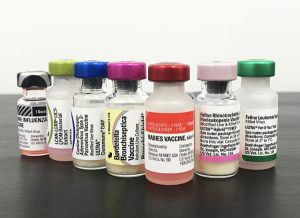
The primary goal of vaccination is to reduce the chances of an animal acquiring a highly infectious, often fatal disease (virus or bacteria). This is best achieved through something you may be familiar with called “herd health”. This means that when the majority of a population is protected from a disease, it greatly reduces the number of individuals acquiring the illness and their ability to spread it. For that reason, we recommend all kittens and puppies be vaccinated against common diseases and then receive boosters at appropriate intervals based on their exposure level to other animals.
Dr. Stephanie Young
West Coast Animal Hospital
Why is the lepto vaccine so essential?
Leptospirosis is a bacterial infection that can cause kidney failure in dogs. It's also zoonotic, meaning humans can contract it from animals. It's predominantly transmitted through infected urine and bite wounds and indirectly through contaminated water, soil, and food that's been contaminated with infected urine. San Diego used to have a very low prevalence of leptospirosis until a couple of years ago when we had a surge in cases. The recent surge is why we've become more proactive about recommending the lepto vaccine. It is very important that you get your dogs vaccinated for leptospirosis yearly to try and help reduce the risk of spreading the disease.
What are some of the common clinical signs that a dog has leptospirosis?
There are a wide variety of clinical signs, but the most common we see are vomiting, decreased appetite, lethargy, increased urination and drinking, weakness, and abdominal pain, to name a few. So if you notice any unusual symptoms, you should consult your veterinarian to determine if leptospirosis could be a possibility.
Are there any risks associated with getting the leptospirosis vaccine?
Over the years, they've worked a lot on the leptospirosis vaccine to try and help reduce the risk for vaccine reactions, and it's improved greatly. With any vaccine, there is a risk, but most commonly, we'll see decreased appetite and lethargy. The signs that we'd be most concerned about would be vomiting, hives, diarrhea, facial swelling, or difficulty breathing. If you notice any of those symptoms, you should contact your veterinarian immediately because your animal could be having a vaccine reaction.
